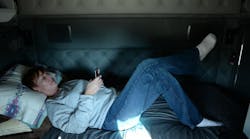The focus of their work – now published in the Journal of Medical Internet Research – looks at relationships between social media use and sleep issues, and—based on assessments the sentiments expressed in users' tweets—gives preliminary hints that patients with sleep disorders may be a greater risk of psychosocial issues.
"Sleep deprivation and chronic sleep disorders are not well understood," noted John Brownstein, one of the researchers on this project and who also directs the hospital's Computational Epidemiology Group.
"We wanted to see if we could use new forms of online data, such as Twitter, to characterize the sleep disordered individual and possibly uncover new, previously-undescribed populations of patients suffering sleep problems," he said.
Brownstein noted that research team used publicly available anonymized data from Twitter to create a “virtual cohort” of 896 active Twitter users whose tweets contained sleep-related words (e.g., "can't sleep," "insomnia") or hashtags (e.g., #cantsleep, #teamnosleep) or the names of common sleep aids or medications.
They then compared data from that cohort to those of a second group of 934 users who did not tweet using sleep-related terms. The team then examined specific data about each Twitter user:
- age
- total number of tweets
- total numbers of followers or people followed
- number of favorite tweets (that is, the number of tweets by others that the user had favorite)
- length of time on Twitter (that is, how long the user had had an active Twitter account)
- average number of tweets per day
- location
- time zone
The researchers also assessed the time of day and average sentiment—positive, neutral, negative—of each user's tweets.
The resulting profile of a Twitter user with sleep issues—compared to a Twitter user without—looked like this:
- have been active on Twitter for a relatively long time
- has fewer followers and follows fewer people
- posts few tweets per day on average
- more active on Twitter between 6:00 pm and 5:59 am
- more active on Twitter on weekends and early weekdays
- more likely to post tweets with negative sentiment
Taken together, the data suggest that Twitter users suffering from some form of sleep disorder are less active on Twitter on average but tweet more during traditional sleeping hours. The increase in negative sentiment in their tweets suggests that sleep-disordered users could be at an increased risk for psychosocial issues, Brownstein noted
"These findings are preliminary and observational only, and need to be studied further," he cautioned. "But they suggest that social media can be a useful addition to our toolkit for studying the patient experience and behavioral epidemiology of sleep disorders."




